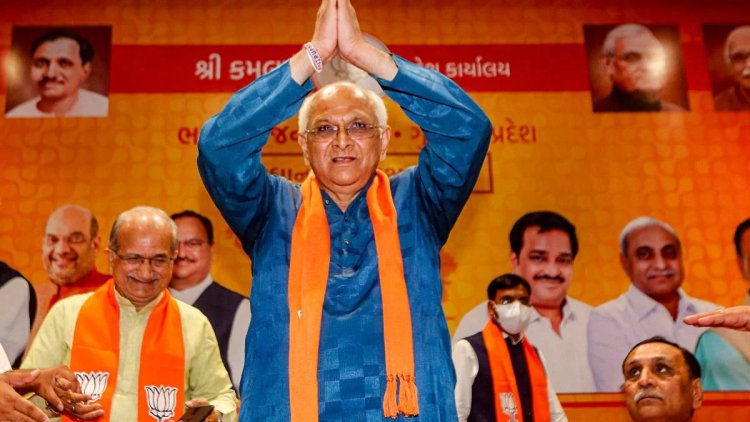Gujarat: Firefighting on Poll Eve
STORIES, ANALYSES, EXPERT VIEWS

Gujarat has a new leader. Bhupendra Patel, a first-time MLA, has been picked to be the new chief minister ahead of the Assembly elections next year. He replaces Vijay Rupani.
In-fighting ?
The new face is being seen as a surprise sprung by the direct intervention of Prime Minister Narendra Modi in his home state. It is also being viewed as a revenge of sorts exacted by former Gujarat chief minister and now Uttar Pradesh governor Anandiben Patel on Union home minister Amit Shah.
Five years ago, when Anandiben had to step down in a huff in 2016, a year ahead of the polls, leading to the appointment of Vijay Rupani, who is counted as “Shah’s man”.
Now, in a replay, Rupani has quietly resigned as chief minister over a year ahead of the polls. Bhupendra, the successor, is known in Gujarat as a “close aide” to Anandiben.
Analysts say it is too early to conclude whether Shah’s standing has been affected by the turn of events in Bengal. “Modiji intervenes whenever things go out of hand. Reports of intense internal bickering and lack of good governance were coming from his home turf and so he had to act,” a BJP parliamentarian from Gujarat said.
Caste politics
Politically and electorally, the choice of Bhupendra was seen as an outreach to the influential Patidar community. Patidars are landlords and an agrarian caste found mostly in Gujarat but also in at least 22 other states of India.
Their anger had seen the BJP struggle in the 2017 Assembly polls, when it won just 99 of the 182 seats, its lowest tally since 1995.
Gujarat leaders said that this time, many more issues like the Covid mismanagement, price rise, lack of jobs and internal squabbling had piled up, prompting the leadership to take corrective measures.
According to the Hindustan Times “the immediate trigger for Vijay Rupani’s resignation as chief minister (CM) lies in his government’s Covid-19 mismanagement, Patidar discontent, and internal organisational rivalries — all in the run-up to polls next year…..
“The BJP may well win Gujarat, but the fact that it has felt compelled to make frequent changes even in its own bastion should serve as a warning.”
Caste calculus driving the BJP to change leaders
Under Modi and Shah, the new BJP has been disregarding politically dominant communities in the states to show that it doesn’t believe in caste politics. The choice of a Patidar as the new chief minister suggests that such a stand has been shelved, at least for now.
To better understand how the BJP tried to break the caste barrier, Economic Times (ET) looks at a few states and their leaders along with the outcome of the decision.
Maharashtra: In Maharashtra, the Marathas have been ruling the state since quite a while. However, the BJP surprised everyone when they chose Devendra Fadnavis, a Brahmin, as the state’s chief minister.
Jharkhand, since its creation in the year 2000, has only had chief ministers from the tribal community. The BJP howewver, selected Raghubar Das, from the Vaishya caste (OBC) as the first non-tribal chief minister. The party has now brought back Babulal Marandi, the tribal chief minister of the state, into its fold to resurrect hopes of winning back the state.
Haryana: The Jats in Haryana, landowners, have always been at the forefront of the politics in the state. Of course, the BJP surprised everyone by choosing a Khatri, Manohar Lal Khattar as the chief minister of the state. Khattar’s continuation as chief minister is facing challenges from the farmers' protests.
Karnataka: The BJP may have factored in the caste arithmetic in its recent choice of chief ministers for Karnatak. Yediyurappa was replaced by another Lingayat, Basavaraj Bommai . The community that has been a traditional vote bank of the BJP.
These experiments didn’t work for the party as it lost power in Maharashtra to rivals after Shiv Sena broke the alliance in 2019. In Haryana, it came back with a reduced majority and lost power in Jharkhand.
















